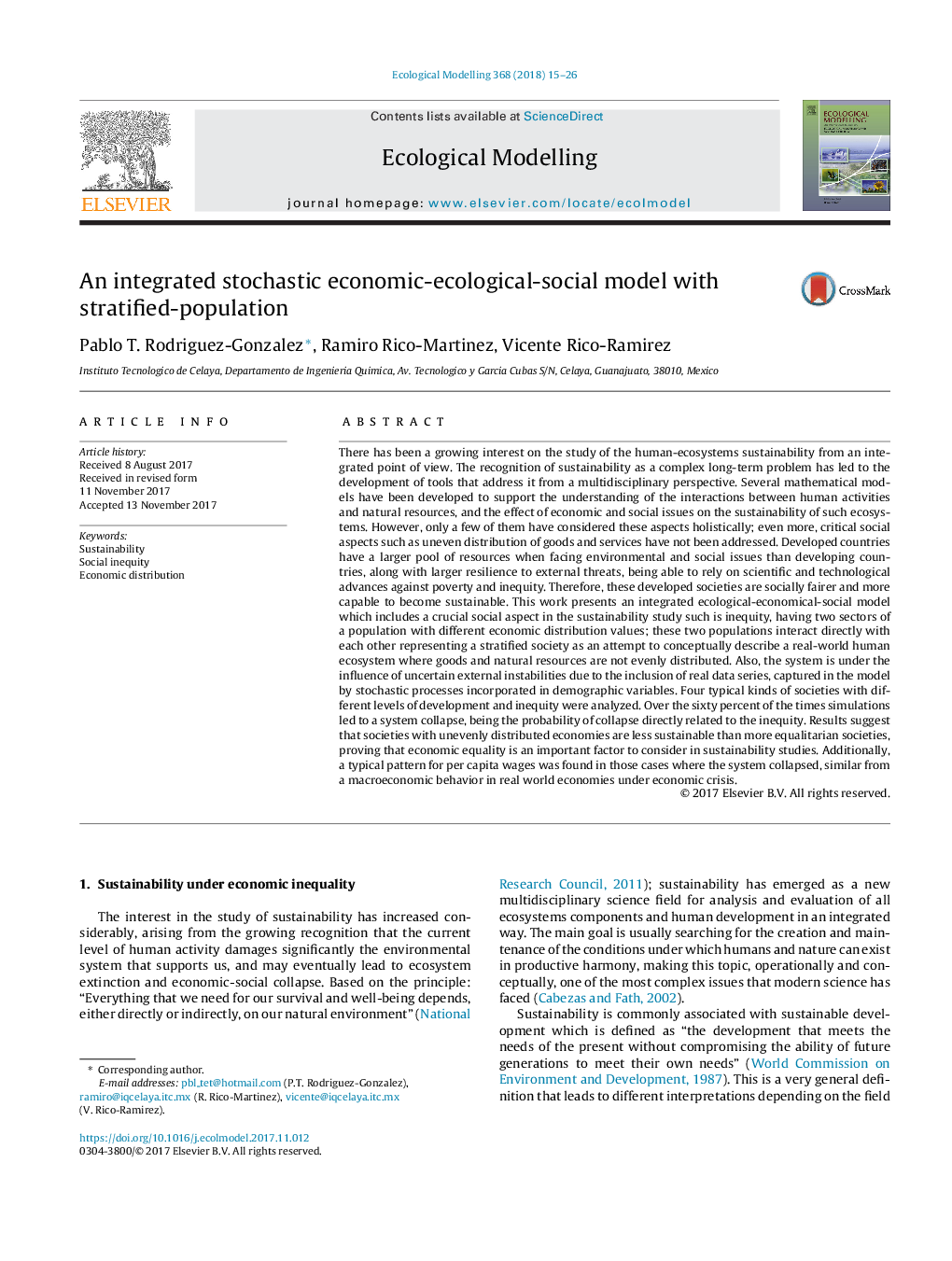| کد مقاله | کد نشریه | سال انتشار | مقاله انگلیسی | نسخه تمام متن |
|---|---|---|---|---|
| 8846126 | 1617379 | 2018 | 12 صفحه PDF | دانلود رایگان |
عنوان انگلیسی مقاله ISI
An integrated stochastic economic-ecological-social model with stratified-population
ترجمه فارسی عنوان
یک مدل اقتصادی-اکولوژیکی-اجتماعی تصادفی یکپارچه با جمعیت طبقه بندی شده
دانلود مقاله + سفارش ترجمه
دانلود مقاله ISI انگلیسی
رایگان برای ایرانیان
کلمات کلیدی
پایداری، بی عدالتی اجتماعی، توزیع اقتصادی،
ترجمه چکیده
علاقمندی روزافزون به مطالعه پایداری انسانها-اکوسیستمها از نقطه نظر یکپارچه شده است. به رسمیت شناختن پایداری به عنوان یک مشکل پیچیده در درازمدت منجر به توسعه ابزارهایی شده است که از منظر چند رشته ای آن را مورد توجه قرار می دهد. چندین مدل ریاضی برای حمایت از درک متقابل بین فعالیت های انسانی و منابع طبیعی و تأثیر مسائل اقتصادی و اجتماعی بر پایداری چنین اکوسیستم ها توسعه داده شده است. با این حال، تنها چند نفر از این جنبه ها را به صورت جامع در نظر گرفته اند؛ حتی بیشتر، جنبه های اجتماعی انتقادی مانند توزیع ناهموار کالاها و خدمات، مورد توجه قرار نگرفته است. کشور های توسعه یافته در مواجهه با مسائل محیطی و اجتماعی نسبت به کشورهای در حال توسعه، با افزایش مقاومت در برابر تهدیدات خارجی، توانایی تکیه بر پیشرفت های علمی و تکنولوژیکی علیه فقر و نابرابری، منابع بیشتری را در اختیار دارند. بنابراین، این جوامع توسعه یافته از لحاظ اجتماعی عادلانه تر هستند و قادر به تبدیل شدن به پایدار هستند. این کار یک مدل اکولوژیکی-اقتصادی-اجتماعی یکپارچه را ارائه می دهد که شامل یک جنبه اجتماعی حیاتی در مطالعه پایداری می شود، مانند نابرابری، داشتن دو بخش از جمعیت با ارزش های توزیع اقتصادی مختلف؛ این دو جمعیت به طور مستقیم با یکدیگر به عنوان یک جامعه طبقه بندی شده به عنوان یک تلاش برای مفهوم توصیف یک اکوسیستم انسان در دنیای واقعی که در آن کالا و منابع طبیعی به طور مساوی توزیع نمی شود، تعامل دارند. همچنین سیستم تحت تأثیر نامطمئن بودن بیثباتی های خارجی به دلیل در نظر گرفتن مجموعه داده های واقعی، گرفته شده در مدل توسط فرایندهای تصادفی که در متغیرهای دموگرافیک قرار دارند، تحت تاثیر قرار می گیرد. چهار نوع خاص جوامع با سطوح مختلف توسعه و نابرابری مورد تجزیه و تحلیل قرار گرفت. بیش از شصت درصد از زمان های شبیه سازی منجر به سقوط سیستم می شود، که احتمال سقوط به طور مستقیم مربوط به نابرابری است. نتایج نشان می دهد که جوامع با اقتصاد نابرابر توزیع شده پایدارتر نسبت به جوامع مساوی هستند و ثابت می کنند که برابری اقتصادی عامل مهمی در مطالعات پایداری است. علاوه بر این، یک الگوی معمول برای دستمزد سرانه در مواردی که سیستم شکسته شد، شبیه رفتار اقتصاد کلان در اقتصادهای دنیای واقعی تحت بحران اقتصادی بود.
موضوعات مرتبط
علوم زیستی و بیوفناوری
علوم کشاورزی و بیولوژیک
بوم شناسی، تکامل، رفتار و سامانه شناسی
چکیده انگلیسی
There has been a growing interest on the study of the human-ecosystems sustainability from an integrated point of view. The recognition of sustainability as a complex long-term problem has led to the development of tools that address it from a multidisciplinary perspective. Several mathematical models have been developed to support the understanding of the interactions between human activities and natural resources, and the effect of economic and social issues on the sustainability of such ecosystems. However, only a few of them have considered these aspects holistically; even more, critical social aspects such as uneven distribution of goods and services have not been addressed. Developed countries have a larger pool of resources when facing environmental and social issues than developing countries, along with larger resilience to external threats, being able to rely on scientific and technological advances against poverty and inequity. Therefore, these developed societies are socially fairer and more capable to become sustainable. This work presents an integrated ecological-economical-social model which includes a crucial social aspect in the sustainability study such is inequity, having two sectors of a population with different economic distribution values; these two populations interact directly with each other representing a stratified society as an attempt to conceptually describe a real-world human ecosystem where goods and natural resources are not evenly distributed. Also, the system is under the influence of uncertain external instabilities due to the inclusion of real data series, captured in the model by stochastic processes incorporated in demographic variables. Four typical kinds of societies with different levels of development and inequity were analyzed. Over the sixty percent of the times simulations led to a system collapse, being the probability of collapse directly related to the inequity. Results suggest that societies with unevenly distributed economies are less sustainable than more equalitarian societies, proving that economic equality is an important factor to consider in sustainability studies. Additionally, a typical pattern for per capita wages was found in those cases where the system collapsed, similar from a macroeconomic behavior in real world economies under economic crisis.
ناشر
Database: Elsevier - ScienceDirect (ساینس دایرکت)
Journal: Ecological Modelling - Volume 368, 24 January 2018, Pages 15-26
Journal: Ecological Modelling - Volume 368, 24 January 2018, Pages 15-26
نویسندگان
Pablo T. Rodriguez-Gonzalez, Ramiro Rico-Martinez, Vicente Rico-Ramirez,
